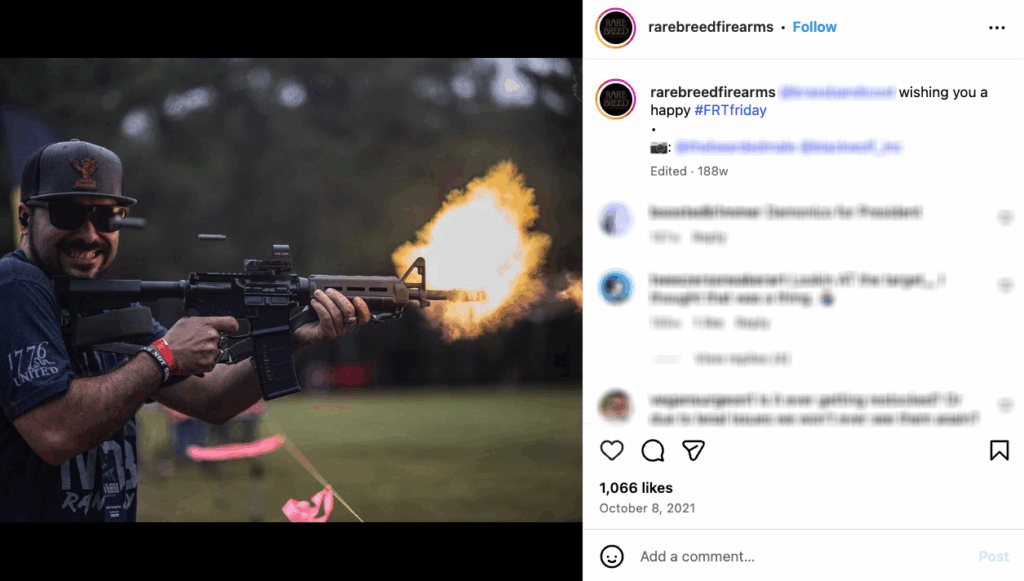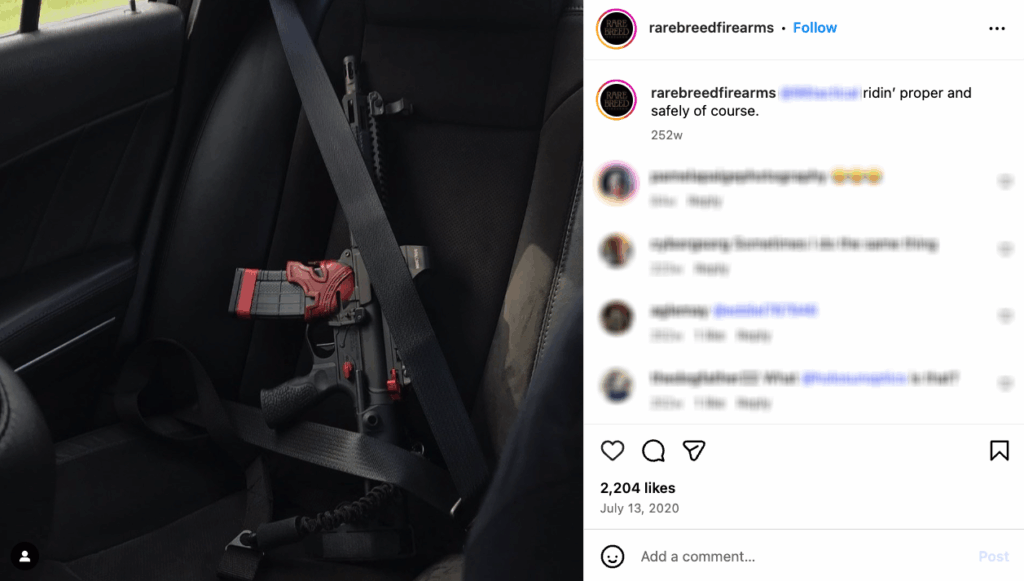For years, the U.S. government held that forced-reset triggers (FRTs), like the kind made by Rare Breed Triggers for AR-style weapons, were machine guns and thus could not be sold to civilians — a position that the Department of Justice defended in several court cases. But on Friday, the department reversed course and announced that it had reached a settlement with Rare Breed Triggers, allowing the Texas-based company to resume selling FRTs once again.
FRTs automatically return forward, or reset, after being pulled. Thus, if a shooter pulls an FRT and holds it to the rear, the gun will continue firing like a machine gun. To learn more about these devices and how they work, click here.
MACHINE GUNS “ENHANCE PUBLIC SAFETY”?
Federal law prohibits civilians from owning machine guns — any weapon that shoots “automatically more than one shot…by a single function of the trigger” as well as any part “designed and intended” to convert firearms into machine guns — manufactured after May 19, 1986. This is why the Bureau of Alcohol, Tobacco, Firearms and Explosives (ATF) first ordered Rare Breed Triggers to stop selling FRTs to customers back in July 2021.
Rare Breed Triggers sued the ATF in an attempt to continue selling FRTs twice, but after both cases were dismissed, the National Association for Gun Rights (NAGR), an extreme gun rights group, filed a separate challenge in the Northern District of Texas. After Judge Reed O’Connor struck down the ATF’s actions classifying FRTs as machine guns, the DOJ appealed to the Fifth Circuit Court of Appeals. David Warrington, a lawyer who founded NAGR, led the organization’s challenge against the ATF, and represented Rare Breed Triggers in court, now serves as the White House counsel.
In announcing the settlement with Rare Breed Triggers, Attorney General Pam Bondi said, “This Department of Justice believes that the [Second] Amendment is not a second-class right. And we are glad to end a needless cycle of litigation with a settlement that will enhance public safety.”
It is unclear how allowing more people to own ARs that mimic machine guns will “enhance public safety.” The 2019 Route 91 Harvest Festival mass shooting in Las Vegas, in which 60 people were killed and over 400 were wounded, is an example of the damage one person can do with AR-15s modified to fire like machine guns using bump stocks. In the aftermath of that shooting, the first Trump administration banned bump stocks through ATF rulemaking. The U.S. Supreme Court later struck down that ban.
Settlement Details
The settlement notes that the U.S. government will move to dismiss three lawsuits involving Rare Breed Triggers, stop enforcing federal machine gun regulations against the company and its patented FRTs for AR-style weapons, and return confiscated FRTs to customers. Nothing in the agreement stops Rare Breed Triggers from developing FRTs for other semi-automatic rifles, including AKs, and other manufacturers may see this as a green light to produce their own designs.
In exchange, Rare Breed Triggers has agreed not to produce or market FRTs for “any handgun” where the “magazine loads into the trigger-hand grip.” But the company never publicly stated that it planned to produce FRTs for handguns. Further, this unique, carefully crafted definition allows Rare Breed Triggers to produce and sell FRTs for a variety of assault pistols where the magazine is inserted ahead of the grip, including AR- and AK-style pistols as well as TEC-9s, Heckler & Koch MP5s, and others.
The settlement also requires Rare Breed Triggers to make “reasonable efforts” to protect its patent by “seeking prohibitory injunctions against any person or entity that manufacture[s], sells, or distributes any FRT.” While the company won an injunction against Big Daddy Unlimited for producing a competing design in 2022, several counterfeit websites sell knockoffs — as Rare Breed Triggers’ president, Lawrence DeMonico, noted in a video on the company’s homepage — and several websites host files for 3D-printing FRTs.
Finally, Rare Breed Triggers “agree[d] to promote the safe and responsible use of its devices…on its website and other online platforms.” FRT-equipped AR-15s are overkill for legitimate purposes like hunting and self-defense, however, and the company’s social media pages show numerous people spraying bullets — sometimes without a thought for their targets.


defying the atf
The DOJ’s decision to drop United States v. Rare Breed Triggers raises questions about the Trump administration’s “tough on crime” pledges. That case began in January 2023, when the U.S. Attorney’s Office for the Eastern District of New York filed a complaint alleging that Rare Breed Triggers had continued selling FRTs even after being ordered to stop doing so in July 2021. The complaint also alleged that the company originally purchased the patent for an AR-15-type FRT that the ATF had previously classified as a machine gun, began producing and selling FRTs based on that patent without ATF approval or registration, and misled customers into believing that they were legal.
According to the complaint, in August 2021, someone from the law office of Kevin Maxwell, Rare Breed Triggers’ owner, called the ATF, warned that the agency’s actions were “treasonous,” and threatened to bring a rocket launcher to an ATF office. A judge also said that he had received threats at the time. Weeks later, DeMonico told an interviewer that his response to the ATF’s cease-and-desist order was “Fuck them.”
In April 2022, DeMonico allegedly stormed into a third-party manufacturing facility in Utah where FRTs were being held for the ATF, loaded “just under 1,000” into a U-Haul van along with “over 15,000 parts and components meant to assemble even more,” and drove off. He was eventually stopped by authorities in New Mexico.
The complaint describes how Rare Breed Triggers continued selling FRTs via email, its website, and third-party retailers. For example, in August 2022, the company allegedly sent a marketing email to customers announcing a “fire sale” for FRTs: “We can’t tell you where these came from and…we can’t tell you why we can’t tell you but rest assured, these are real [FRTs].” According to authorities, the company tried to conceal the FRTs it shipped to customers by labeling them as coming from “Red Beard Treasures.”
“the cuffs are off”
According to the complaint, the ATF estimated that Rare Breed Triggers sold over 80,000 FRTs between December 2020 and January 2023, generating over $29 million for the company.
After the settlement was announced, Rare Breed Triggers posted a video on Instagram announcing the “TOTAL VICTORY OVER THE ATF” and featuring DeMonico, who discussed how the “lawfare” and “executive overreach” concerning his product — which “no one had the guts to bring to market” — was over. As of this writing, the Rare Breed Triggers website noted, “The cuffs are off. As of May 16, 2025, we’re free!”